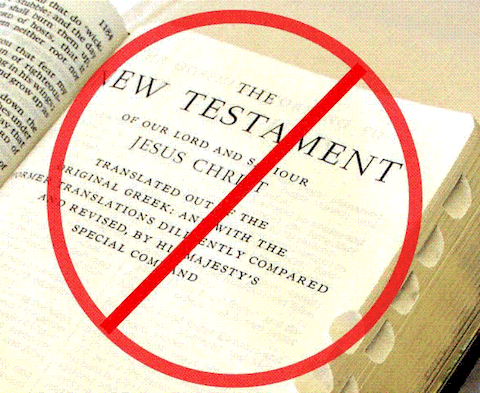
1001 Errors in the Christian Bible
Home
Dedication
Matthew
Mark
Luke
John
Acts
Contact Us
Luke -- Errors 472-478
#472
Luke 24: (KJV)
36 “And as they thus spake, Jesus himself stood in the midst of
them, and saith unto them, Peace be unto you.
37 But they were terrified and affrighted, and supposed that they had
seen a spirit.”
Compare to Matthew 28: (KJV)
16 “Then the eleven disciples went away into Galilee, into a mountain
where Jesus had appointed them.
17 And when they saw him, they worshipped him: but some doubted.”
Luke’s eleven’s reaction to Jesus was terror and fright while
Matthew’s eleven’s reaction to Jesus was to worship him.
# 473
Luke 24: (KJV)
39 “Behold my hands and my feet, that it is I myself: handle me,
and see; for a spirit hath not flesh and bones, as ye see me have.”
Jesus offers his hands and feet as evidence that Jesus is Jesus. The implication
of hands and feet as evidence is this is what would have been evidence
of crucifixion. The problem is that it is now universally agreed that
no one was crucified with nails through the hands because it wouldn’t
support the weight of the body. It’s arguable that the underlying
Greek word for “hands” can on rare occasion refer to a wider
area around the hands including the wrists but the dominant Christian
understanding of the verse (including their prohibited graven images)
has always been that “hands” meant “hands”.
# 474
Luke 24: (KJV)
39 “Behold my hands and my feet, that it is I myself: handle me,
and see; for a spirit hath not flesh and bones, as ye see me have.”
Anachronistic touch here. The best evidence to Jesus’ supposed audience
that Jesus was Jesus were “Mark’s” on his hands and feet?
For anyone who actually knew Jesus the best evidence would be his face
or maybe the answers to some carefully selected questions such as “What’s
yer favorite color?” or “What’s the air speed velocity
of a swallow?”. The supposed hands and feet evidence would be better
for the author’s audience and not Jesus’ audience as they never
met Jesus and wouldn’t know what he looked like.
# 475
Luke 24: (KJV)
44 “And he said unto them, These are the words which I spake unto
you, while I was yet with you, that all things must be fulfilled, which
were written in the law of Moses, and in the prophets, and in the psalms,
concerning me.”
More anachronism’s. The author has Jesus interpreting what he supposedly
previously said. This is what an author would do, not a character. In
any case the Tanakh never mentions “Jesus” and most of the claimed
prophecy fulfillment in the Christian Bible refers to verses from the
Tanakh that are clearly not Messianic.
# 476
Luke 24: (KJV)
46 “And said unto them, Thus it is written, and thus it behoved
Christ to suffer, and to rise from the dead the third day:”
There is no prophecy in the Tanakh that the Messiah would be resurrected
on the third day. Apparently what the author of Luke means when she claims
she read the claim is that she wrote it down and then read it.
# 477
Luke 24: (KJV)
47 “And that repentance and remission of sins should be preached
in his name among all nations, beginning at Jerusalem.”
The earliest extant manuscripts give “repentance for the remission
of sins”. This agrees with Luke 3:3: (KJV)
“3 And he came into all the country about Jordan, preaching the
baptism of repentance for the remission of sins”
A central theme of the Gospels is that John the Baptist started the process
of repentance for the remission of sins and Jesus continued it. “Luke”
indicated in the previous verses that Jesus died in order to fulfill prophecy,
not to remove sin. Obviously this was a problem for subsequent Christianity
which started changing “Luke” to “repentance and remission
of sins” to avoid showing that it was primarily repentance that led
to removal of sin (too Jewish) and almost all modern Christian translations
show this change.
# 478
Luke 24: (KJV)
46 “And said unto them, Thus it is written, and thus it behoved
Christ to suffer, and to rise from the dead the third day:”
47 “And that repentance and remission of sins should be preached
in his name among all nations, beginning at Jerusalem.”
There’s nothing written in the Tanakh about repentance for the remission
of sins being preached in the Messiah’s name.